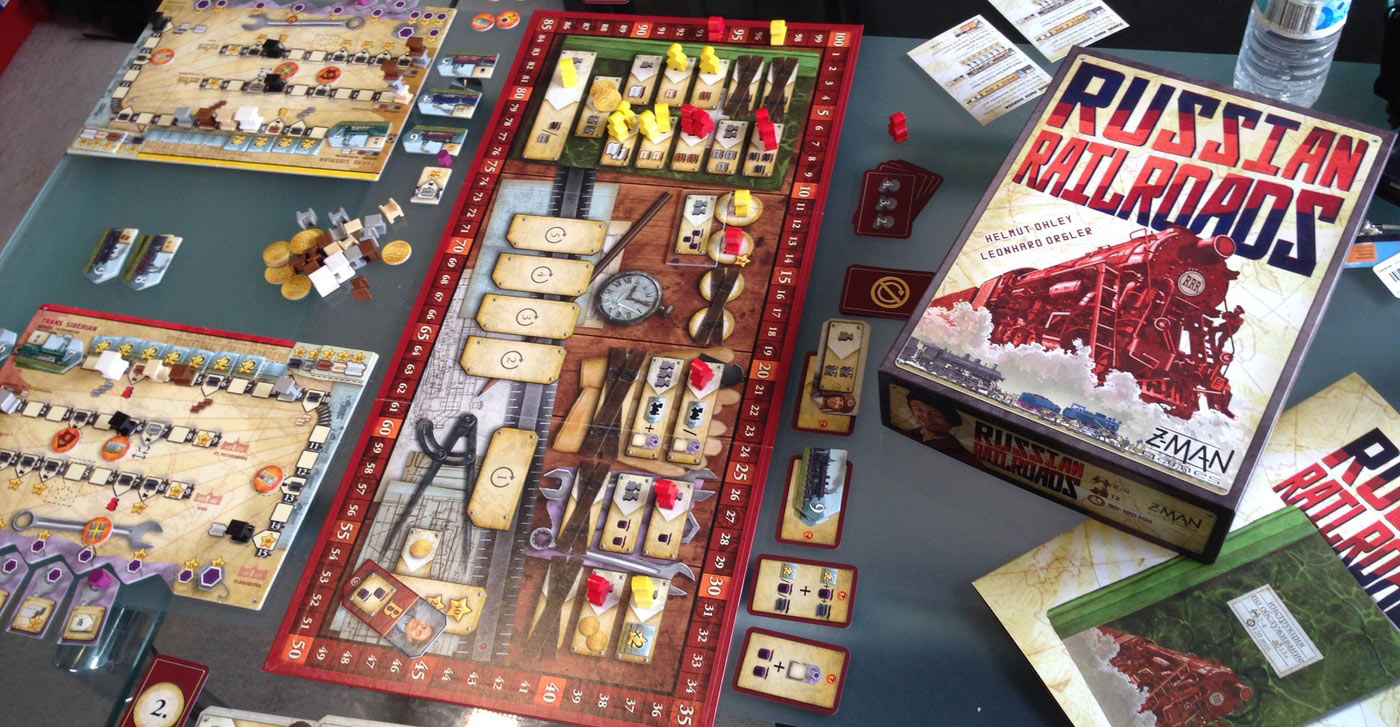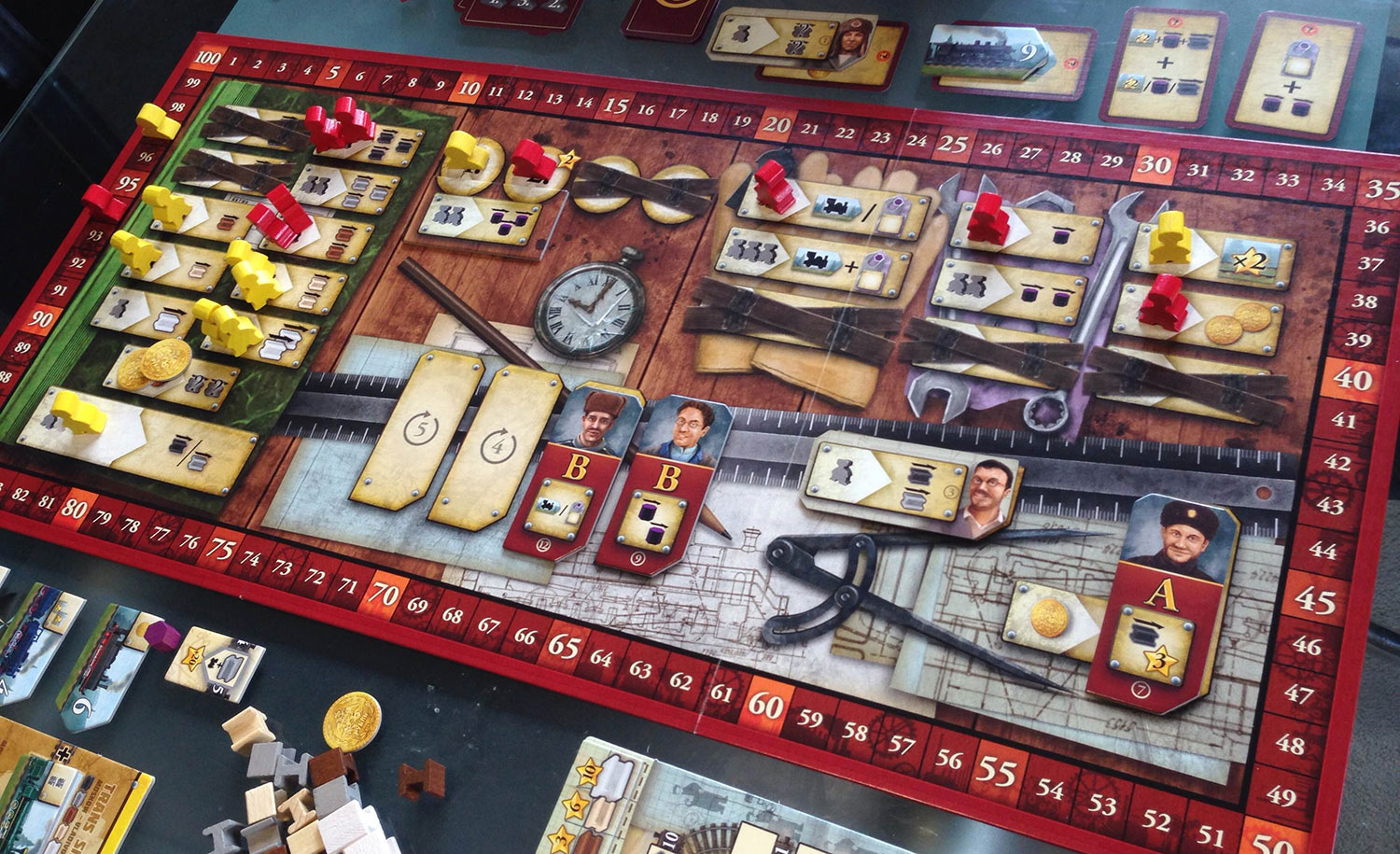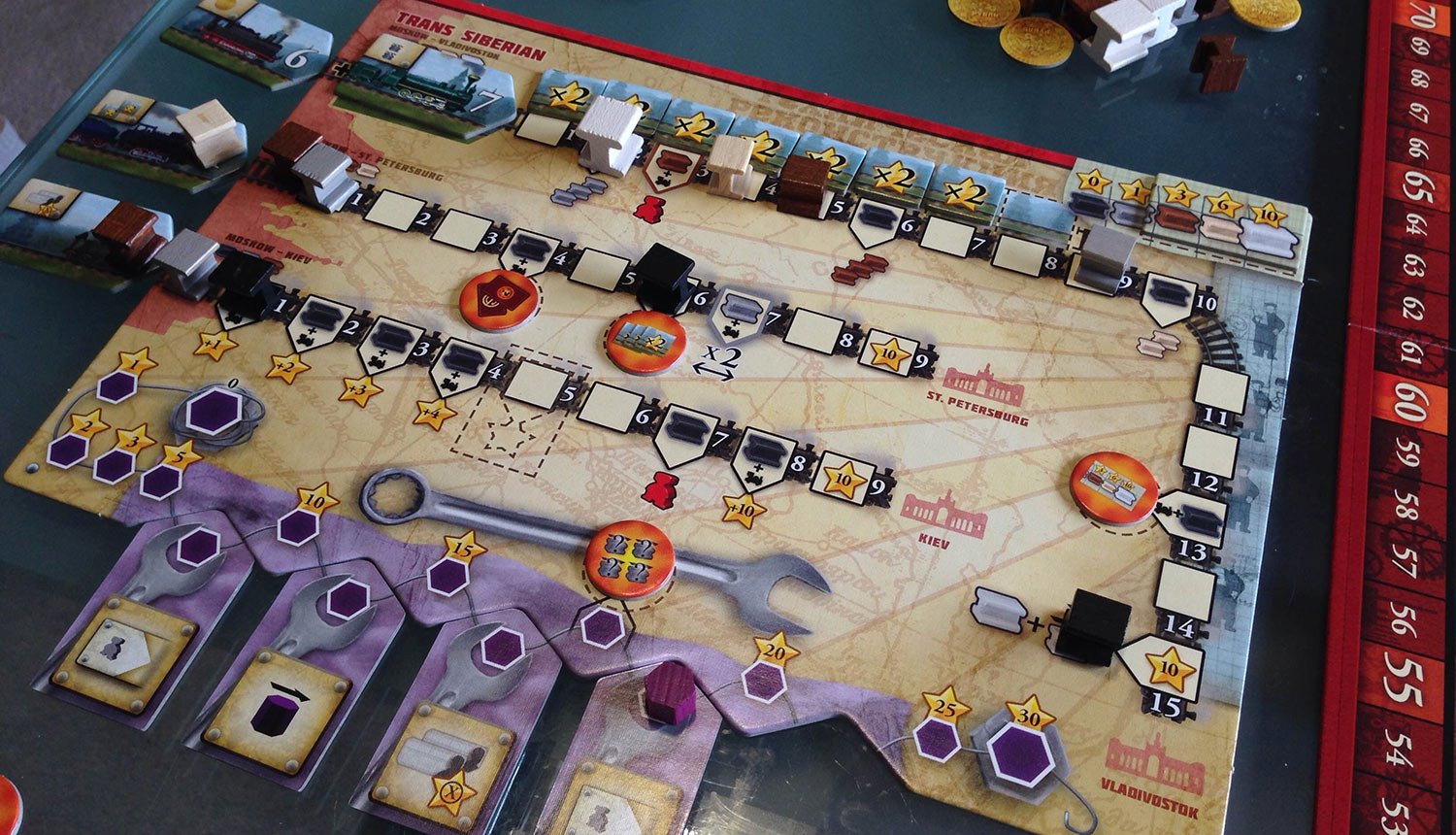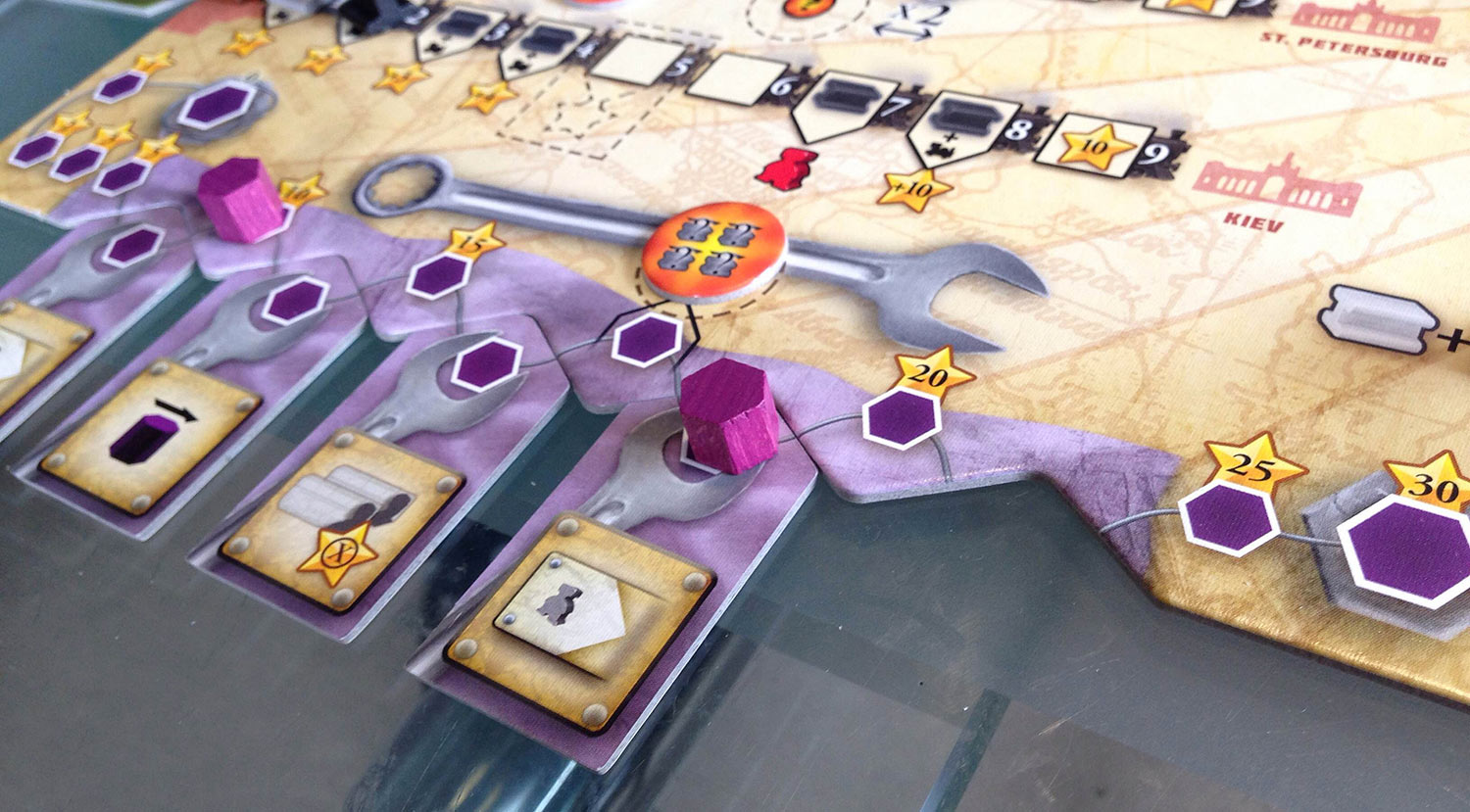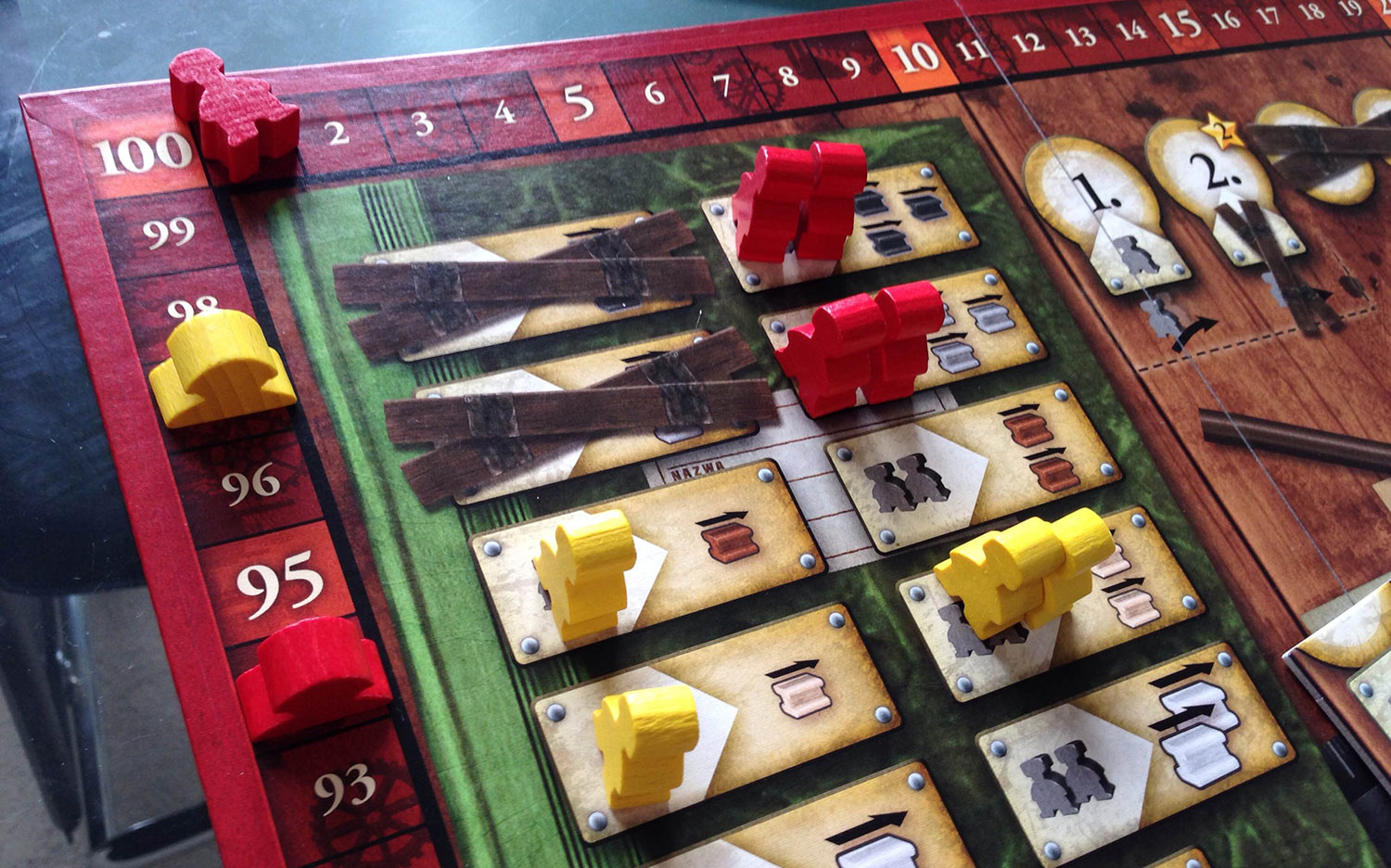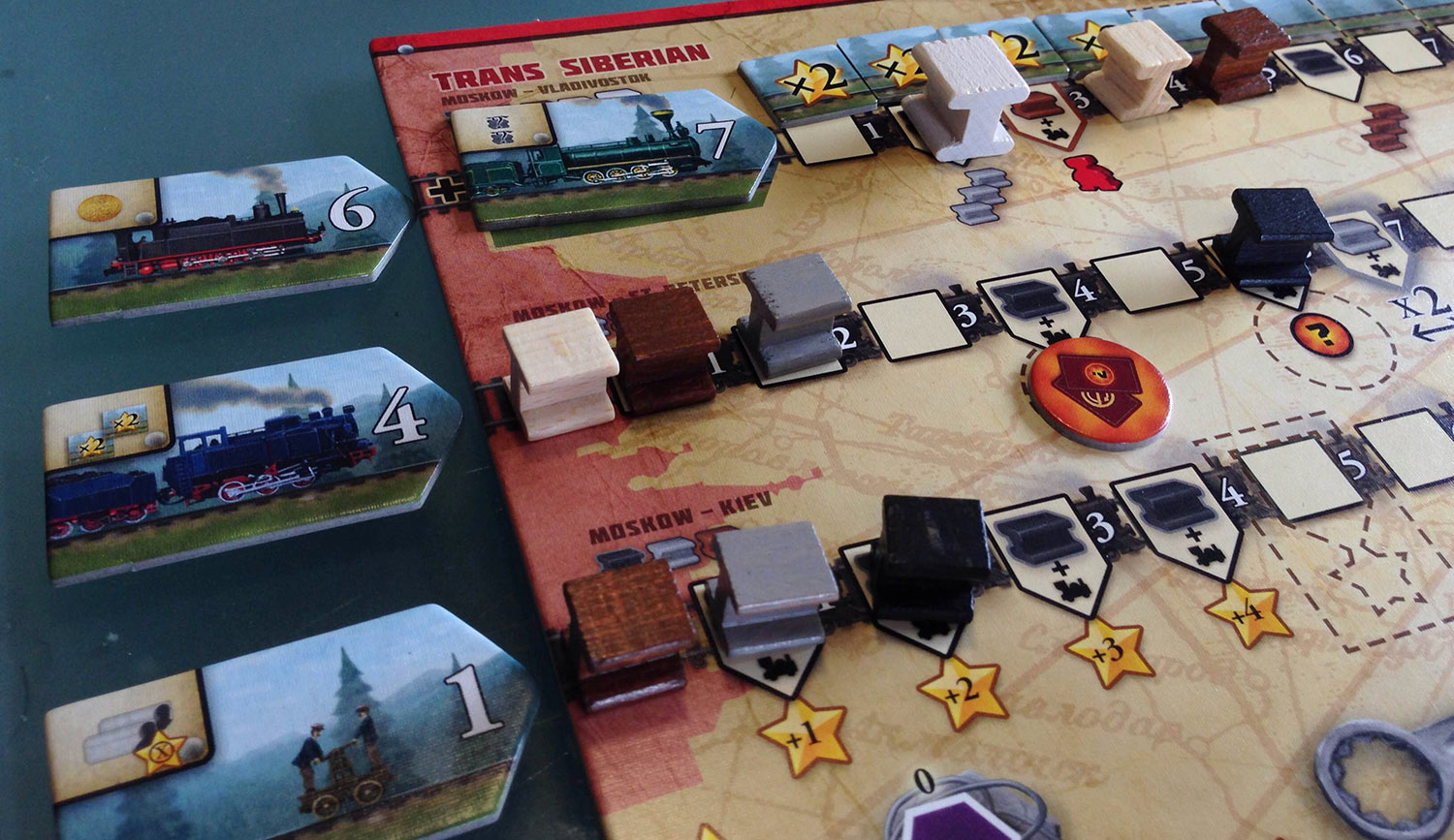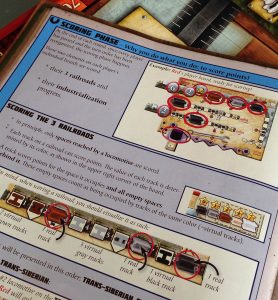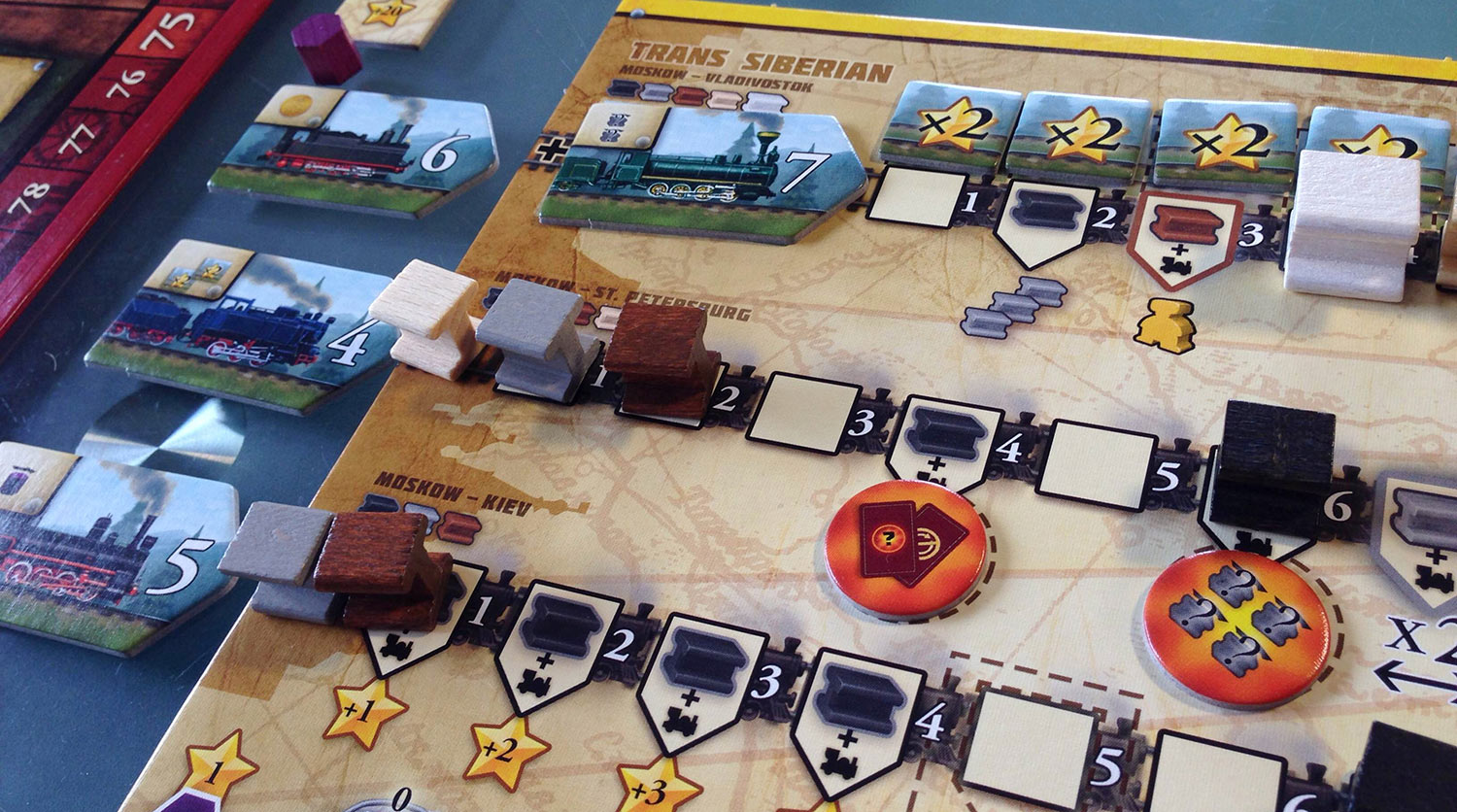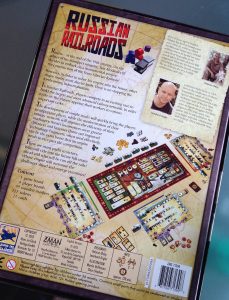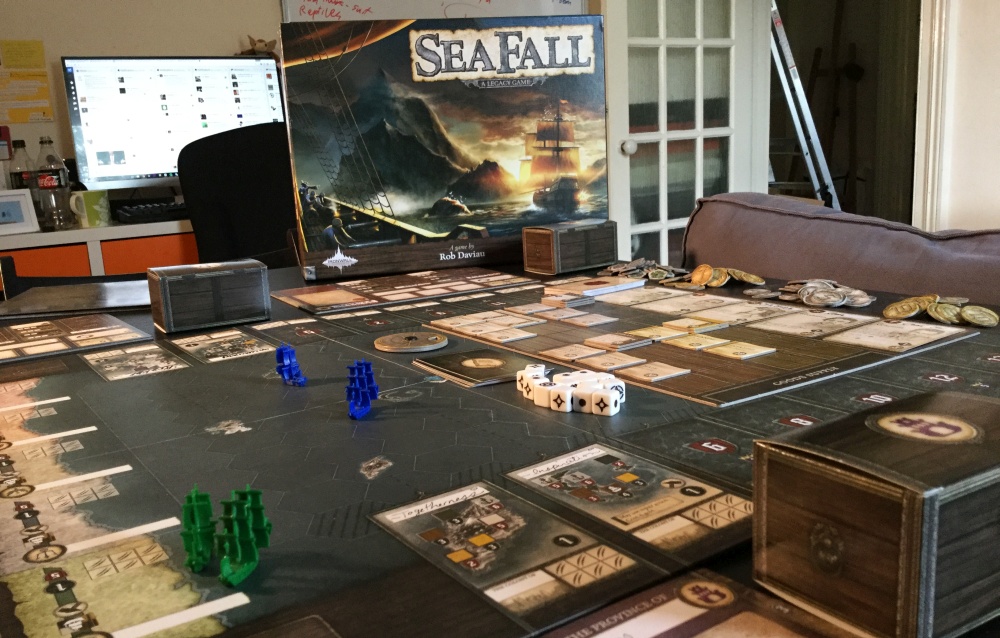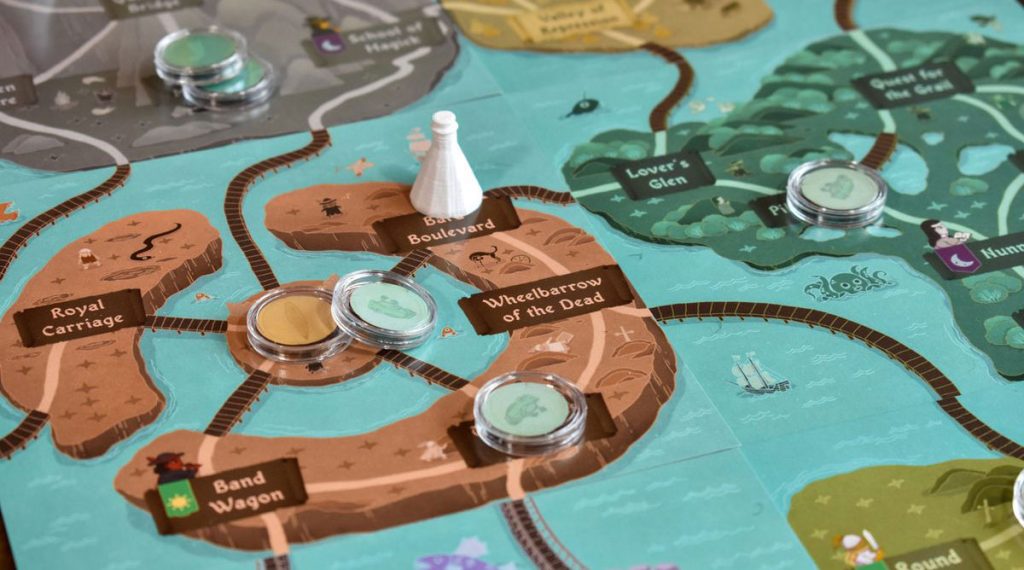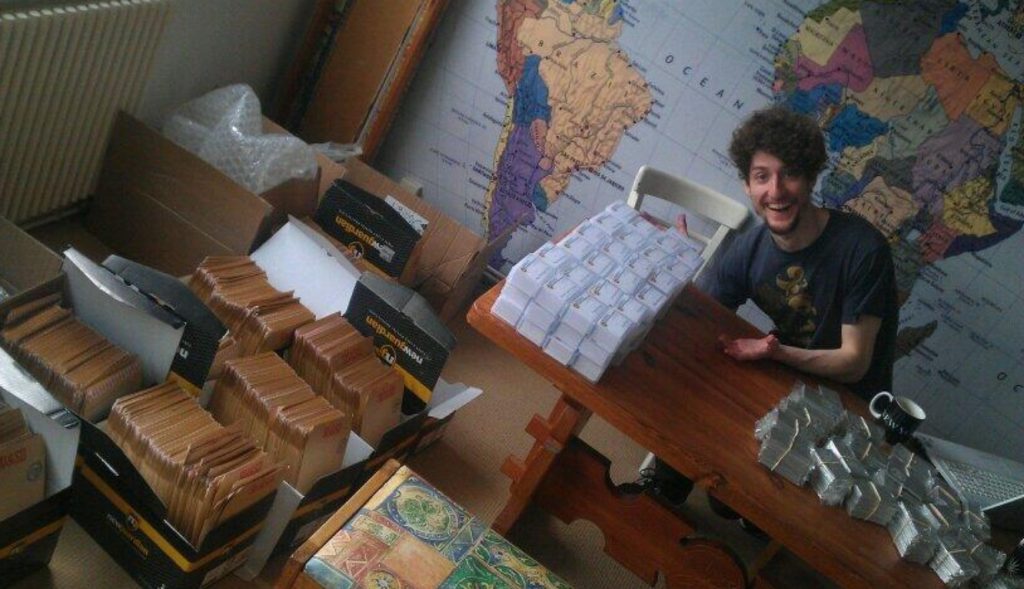Quinns: At the end of last year the rumbling around Russian Railroads became unignorable. Once a day I’d notice my mug of tea trembling as this game’s engine sped across the internet with a roar of hype. I decided to let it pass, though, knowing that if the rumours were true then this train, then progress itself would soon arrive at my sleepy flat.
Sure enough, Z-Man Games recently sent it over. Russian Railroads is a proud, barrel-chested member of a category called “Hard Euros”, and while that sounds like a DVD you’d find in the bargain bin of a sex shop* these are among the least sexy of games. Rather than forcing players to battle directly (which is RUDE), Eurogames offer a proxy-puzzle for players to simultaneously sweat over.
You might remember our review of T’Zolkin: The Mayan Calendar, with its dizzying, rotating gears, or our awe at the piglet maths of Castles of Burgundy, or our more recent video reviews of Caverna or Terra Mystica, each one an impressive eurogame. Today the industry is choked with these hale, rubust puzzles. Stepping inside the creaky carriage of Russian Railroads I had one question lurking at the bottom of my brain like cerebral sediment. “This game’s going to be clever and all, but do we need it?”
SO! Russian Railroads’ hook is a fittingly Russian one, which is scale. Players are all industrialists racing to build the Trans-Siberian railroad, though this scale actually comes from the overwhelming spread of mechanics. A sprawling patchwork of concepts that will excite some people, and cause an equal number of people to push their individual player board away as if it were a plate of brains.
The game proper sees you taking turns to place workers on a central board (seen above), taking a particular reward for yourself and denying it to their opponents, until everyone takes their workers back at the end of the round. Mostly, these spaces allow you to advance tracks on your personal player board.
STOP! Let’s look at your personal player board.
Yep.
You’ve got three routes you can develop, slowly progressing your black “track” tokens down them to indicate your progress. Now! Do you see all the things marked beneath the tracks, like the three grey track pieces beneath the second space on the upper-most route? Those are rewards you get for reaching that space with whatever track is depicted in the space above it. So, the first reward you’re likely to get is three grey track pieces, which are placed behind your black track pieces on all three routes. So you’re now advancing SIX tracks of two different colours down three routes.
This is also where Russian Railroads’ theme turns out to be, pardon my French, a load of hot train bollocks. Why are players all simultaneously building the same route, starting from Moscow and ending at Vladisvostok? Why are you building five different colours of track? Why can some players get locked out of the ability to move brown tracks? That usually only happens if I eat too many of my wicked beans.
I’ll admit to not caring about this during my games, though, because my head was melting. Back to the explanation!
So you’ve unlocked some grey tracks. You’re now able to get victory points for advancing these, because every track type after the default black ones will earn you victory points if you’ve advanced them AND have a train that reaches that far. STOP! Go back to the central player board. You can get trains from a particular space on this board. Except when you get a train from this you could instead flip the tile and take it as a factory!
What are factories?! STOP! Let’s go back to your player board.
See that purple strip at the bottom? That’s your industrialisation track which also offers rewards and victory points if you advance a marker down it, though as you can see you need factories to complete the path that the marker moves down.
We’ll stop with our explanation there, even though I haven’t discussed roubles, multiplier tokens, the fact that each of your tracks scores radically differently, engineers (which offer you private spaces where only your workers can visit) OR the four laughable circular spaces on your board which, when unlocked, immediately offer you one of seven huge rewards, one of which is access to one of one of five slightly smaller-bonus cards and one of ten secret end of game scoring cards. What?!
Hopefully you get the gist of this and aren’t this second facedown on your keyboard with a nosebleed. To play Russian Railroads is to experience your brain being submerged in questions and calculations for two exhausting hours, trying to determine which of four, six, eight immediate rewards you should be advancing towards, and THEN cross-referencing your flimsy strategy with the main board, trying to figure out how best to achieve it while flinging as many elbows into your opponents’ faces as possible.
All of which is at once tremendously byzantine (why is the St. Petersburg route abruptly worth double when you hit space seven?) and clearly a meticulously-playtested labour of love from the designers. Get your head around it and Russian Railroads is a hopelessly absorbing puzzle from start to finish. BUT IS IT FUN?
To answer that I’m going to bring in novice engineer Matt Lees. He went into Russian Railroads having never played a eurogame before, which is a bit like having never watched TV before and then having one broken over your head. How’s it going, Matt?
Matt: Hi Quinns! Yeah I’m great, although it does feel like someone filled a wooden bucket full of maths and then smashed that bucket into my face.
Quinns: Let’s talk about the game’s pace a bit. Because it didn’t start that brutally, did it? We had our silly little steam engines and were quite happy nudging our first few tracks along. It was nice! AND THEN…
Matt: I can’t pinpoint the exact point at which it all went wrong. And I don’t even mean the game, particularly – I just mean the processes chugging through my brain. We had three lines to choose between, a selection of cool trains to play with in the future, and hugely broad selection of strategies to choose from. I was going to focus on amassing tech and engineers, before – at the very last minute – pulling entire railroads out of my sleeve, like some sort of gigantic magician. But then the variables and opportunities and options started to spiral, and I found myself trapped in an impossible puzzle of constantly trying to work out the optimal move.
I say impossible, but really what I’m alluding to is “oh god I’m genuinely rubbish at maths”. Rather than building up to one gigantic swift coup at the end of the game, I found myself constantly worrying about efficiency – scraping together the best score I could in the knowledge that missing out on just a few points could well lose me the game. For someone so genuinely obsessed with optimising strategies and planning ahead – but someone so utterly inept at maths – I found the clash of conflicts going on in my head to be utterly exhausting, to the point at which by the end of the game I’d been forced to stop caring and desperately needed something that resembled a scotch egg and a large mug of tea. If I’d been a bit more relaxed about making mistakes I probably wouldn’t have found it so stressful, but sadly that just isn’t in my DNA – and I can imagine that a lot of other gamers are the same.
Quinns: I remember Brendan commenting, from the other side of the room, that you and I had gone very quiet. That was around round 4 of 6, I think? And of course we were quiet. We were away with the maths fairies. The room could have been on fire and we’d have stayed locked in thought.
Actually, I quite liked how the game sped up. The paltry points we were earning in round 1 had been replaced by these horrific combos that lead to me scoring 110 points in the final round, completing a lap of the victory point track on ONE TURN. Six multipliers on the top track, with top-tier white tracks, and a point-booster…
Matt: But didn’t that make you feel like a bit of a numpty for getting so stressed out about strategizing a way to achieve a mighty EIGHT points on the second turn?
Quinns: Well, no? Because I was so excited about scoring more and more and MORE each turn. But now I think about it, most eurogames let you build something more tangible. A stone age tribe, a cave network, a city, a business. It’s like a cushion, something to soften the puzzle if you’re not winning. At least you built a nice thing! Russian Railroads isn’t really about building anything. You’re spending two hours manufacturing a railroad spike from multipliers and wit and trying to drive it through the game / your friends’ egos.
Matt: The thing was, I thought it very much felt like a game about railroads, and steam trains. The acceleration of the game fit that, but mostly it felt like we were stuck on a course. It’s a game that very much felt like you had to have a strong direction quickly – changing strategies halfway through the game felt like an almost impossible task. I didn’t realise it at the time but I’d effectively built a track that led straight into a brick wall. By the time I’d worked it out, the pace of the game was too fast to do anything to correct that.
Quinns: OK. We can’t agree on anything. Let’s fight each other with sledgehammers.
Matt: Wait! Maybe this was just a terrible place to start playing Eurogames. And I did enjoy myself, aye – I just think I would have enjoyed myself more if I’d brought a calculator. And when I find myself thinking things like that, I start to question whether or not I’m playing the right game. Up until that point I was having a lot of fun, and I think if you’re someone who doesn’t struggle with that stuff you’d probably have a bloody good time. Personally though my brain rebelled against it, knocked over the chalkboard, and started eating crayons.
Quinns: You know what? I bet the people who should buy this game will feel it in their… the maths part of their brain. Let me google it.
Matt: I think it’s called the “Hot Number Box”. I did neuropsychology for a bit at uni.
Quinns: Great. Everybody! If you feel a longing to heat your hot number box to levels that were almost intolerable to professional game reviewers, Russian Railroads could easily become a favourite in your collection. Everybody else? You might want to try something a little less taxing. Like…
Matt: Doing your taxes?
Quinns: Right.
* we have DEFINITELY made that joke before

